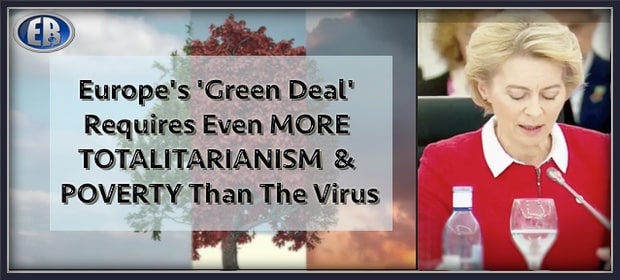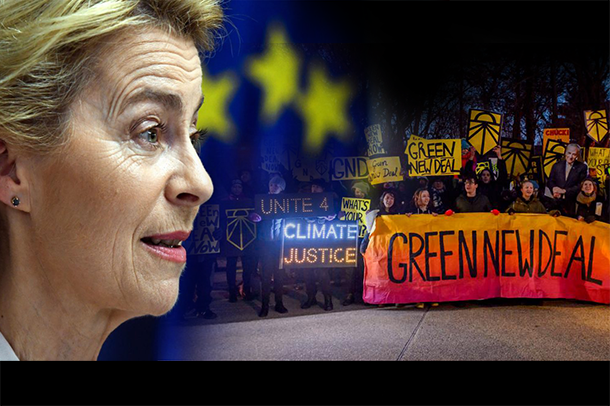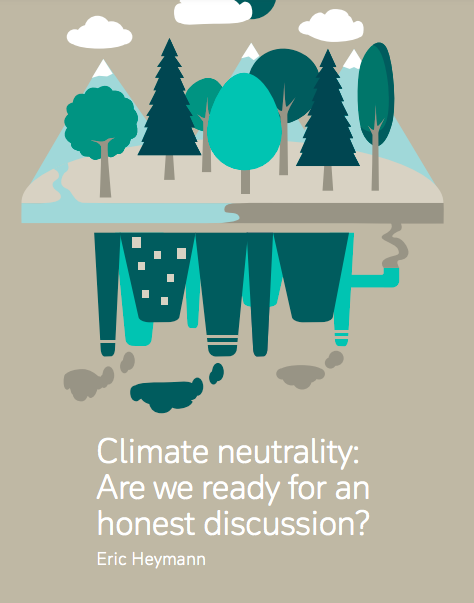
ER Editor: As with the sheer madness of obliging people to wear masks, limit their movements and take a dangerous, experimental vaccine for a mild virus, the Green New Deal as outlined – still somewhat vaguely – below, will require more crippling expense and restriction on the citizenry, again for WHAT? It’s all dictatorial and quite harebrained.
********
Deutsche Bank Admits EU Will Need ‘Eco-Dictatorship’ to Implement Green New Deal
21WIRE
Following President Joe Biden’s announcement that the United States would be rejoining the Paris Climate Accords and subsequent reiterations about pursuing a ‘net zero’ carbon emissions goal by sometime between 2030 and 2050, many are left asking how is such a radical transition in energy markets and usage practical, let alone even possible?
A senior economist at Deutsche Bank warns that for the EU’s own Green New Deal to succeed, “a certain degree of eco-dictatorship will be necessary.”

Needless to say, the implications of this are far-reaching, and will penetrate every level of society and the political economy. As this author aptly points out, in order to achieve carbon neutral by 2050, Europe’s economy and entire political and legal systems will have to be fundamentally altered.
The Global Warming Policy Forum reports…
An analysis published by Deutsche Bank sharply criticises the “dishonest debate” with which the EU is selling its “Green Deal” to the people of Europe. The massive risks of the project for prosperity, the economic system and democracy itself should not be concealed, but should be addressed openly.
Eric Heymann, a senior economist at Deutsche Bank Research, warns that Europe’s Green Deal and its goal of climate neutrality by 2050 threatens a European mega-crisis, leading to “noticeable loss of welfare and jobs”. And he warns: It won’t work without “a certain degree of eco-dictatorship”.
The analyst describes it as dubious that the Green Deal is being touted across the board as “a new growth strategy,” which would allow the EU to become a “fair and prosperous society.” While this may look good on paper, Heymann writes, in order to achieve carbon neutral by 2050, Europe’s economy and its entire political and legal systems will have to be changed fundamentally.
Some parties will find arguments against strict climate protection policies if the latter lead to a significant increase in energy prices or to restrictions of personal freedom or ownership rights. And let us not fool ourselves: these parties will find voter support. At the EU level, there will be major conflicts about distribution, which may contribute to (further) divisions within the bloc. Are we ready to deal with this polarisation?
For the time being, the revolutionary consequences of the EU’s climate agenda for everyday life are “still relatively abstract,” and for most households “still acceptable.” Soon, however, the path towards climate neutrality will require drastic interventions in the choice of means of transport, the size of housing, the means of heating, the possession of electronic consumer goods, as well as restrictions in the consumption of meat and tropical fruits.
And he warns these restrictions and infringements will inevitably trigger “massive political resistance.”
Below are excerpts of Eric Heymann’s (Deutsche Bank Research) analysis.
****
Climate neutrality: Are we ready for an honest discussion?

A certain degree of eco-dictatorship will be necessary
The impact of the current climate policy on people’s everyday lives is still quite abstract and acceptable for many households. Climate policy comes in the form of higher taxes and fees on energy, which make heating and mobility more expensive. Some countries have set minimum energy efficiency standards for buildings or similar rules in other areas. However, climate policy does not determine our lives. We take key consumption decisions, for example whether we travel at all, how much we travel and which means of transport we use, whether we live in a large house or a small apartment and how we heat our homes, how many electronic devices we have and how intensely we use them or how much meat and exotic fruit we eat. These decisions tend to be made on the basis of our income, not on climate considerations.
If we really want to achieve climate neutrality, we need to change our behaviour in all these areas of life. This is simply because there are no adequate cost-effective technologies yet to allow us to maintain our living standards in a carbon-neutral way. That means that carbon prices will have to rise considerably in order to nudge people to change their behaviour. Another (or perhaps supplementary) option is to tighten regulatory law considerably. I know that “ecodictatorship” is a nasty word. But we may have to ask ourselves the question whether and to what extent we may be willing to accept some kind of eco-dictatorship (in the form of regulatory law) in order to move towards climate neutrality. Here is an example: What should we do if property owners do not want to turn their houses into zero-emission buildings; if they do not have the financial means to do so; if doing so is not possible for technical reasons or if the related investments do not pay off?
Loss of competitiveness or restrictions to free trade
If the EU moves considerably more quickly towards climate neutrality than the rest of the world, carbon prices in the EU will rise more rapidly, too. This will reduce the competitiveness of energy-intensive companies in the EU. Are we willing to pay that price? Probably not – remember, nobody is to be left behind. So will we subsidise these companies to enable them to use expensive, but climate-friendly technology? This option will be difficult to implement in the long run due to budget constraints. An honest discussion will have to deal with the truth that each euro spent on climate protection is no longer available for expenses on education, research, public health, digital infrastructure, domestic and external security, tax cuts or higher pensions. The EU commission plans to introduce a carbon border adjustment system to address the competition problem. Do we really believe that doing so will not make the affected countries introduce countermeasures? Are we really willing to give up the advantages of free trade in favour of climate protection?
Massive political resistance ahead
Nobody is to be left behind on the path towards climate neutrality. This statement from the Green Deal probably amounts to trying to square the circle. A major turnaround in climate policy will certainly produce losers among both households and corporates. In addition, prosperity and employment are likely to suffer considerably. If this was not the case, climate protection would be an easy undertaking. These developments will obviously have an impact on the political landscape, both at the national and EU level.
Some parties will find arguments against strict climate protection policies if the latter lead to a significant increase in energy prices or to restrictions of personal freedom or ownership rights. And let us not fool ourselves: these parties will find voter support. At the EU level, there will be major conflicts about distribution, which may contribute to (further) divisions within the bloc. Are we ready to deal with this polarisation? Or will we adjust our climate policy ambitions if we find that (overly) ambitious climate policies are not acceptable to a majority of the people?
READ: The full analysis is available at Deutsche Bank Research (pp. 70-73)
************
Source

••••
The Liberty Beacon Project is now expanding at a near exponential rate, and for this we are grateful and excited! But we must also be practical. For 7 years we have not asked for any donations, and have built this project with our own funds as we grew. We are now experiencing ever increasing growing pains due to the large number of websites and projects we represent. So we have just installed donation buttons on our websites and ask that you consider this when you visit them. Nothing is too small. We thank you for all your support and your considerations … (TLB)
••••
Comment Policy: As a privately owned web site, we reserve the right to remove comments that contain spam, advertising, vulgarity, threats of violence, racism, or personal/abusive attacks on other users. This also applies to trolling, the use of more than one alias, or just intentional mischief. Enforcement of this policy is at the discretion of this websites administrators. Repeat offenders may be blocked or permanently banned without prior warning.
••••
Disclaimer: TLB websites contain copyrighted material the use of which has not always been specifically authorized by the copyright owner. We are making such material available to our readers under the provisions of “fair use” in an effort to advance a better understanding of political, health, economic and social issues. The material on this site is distributed without profit to those who have expressed a prior interest in receiving it for research and educational purposes. If you wish to use copyrighted material for purposes other than “fair use” you must request permission from the copyright owner.
••••
Disclaimer: The information and opinions shared are for informational purposes only including, but not limited to, text, graphics, images and other material are not intended as medical advice or instruction. Nothing mentioned is intended to be a substitute for professional medical advice, diagnosis or treatment.





deustche bank is one of the most corrupt bank in the world + they are totally bankrupt, alive only by taxpayers infusion and massive collusion with the ultra corrupt politicians of the EUSSR.
Thye are part of the sick agenda they try ot force on us and part of the covid scam too!